Investigate the transformative journeys of biblical exiles, uncovering timeless lessons in faith, resilience, and redemption that still inspire today.
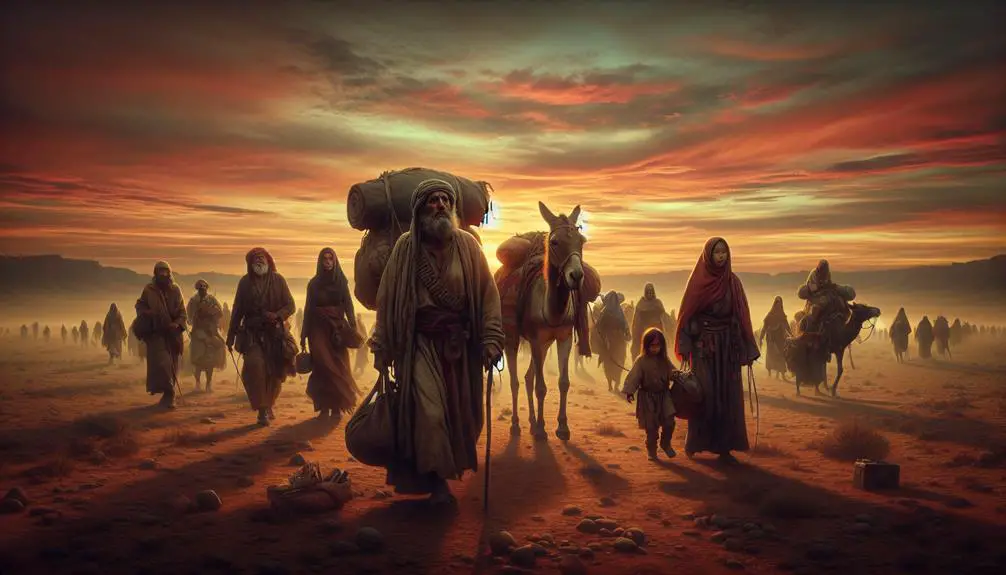
Exiles in the Bible
In the grand scheme of divine real estate transactions, being exiled is perhaps the most earth-shattering, quite literally for some biblical figures. You've likely pondered the tales of Adam and Eve's eviction notice from Eden or Moses' extended desert retreat in Midian.
These stories, while ancient, carry profound lessons that resonate through millennia, touching on themes of faith, resilience, and redemption. As you explore these narratives, consider how the experience of exile shaped not only the lives of these individuals but also the foundational beliefs and traditions of entire communities.
What untold wisdom might you uncover in their journeys?
Key Takeaways
- Exile often served as a consequence for disobedience but also a catalyst for personal growth and transformation.
- Individuals in exile frequently experienced tests of character, leading to significant roles or positions upon overcoming these challenges.
- The ability to interpret dreams or recognize divine signs in exile demonstrated a connection to divine providence and wisdom.
- Building relationships and integrating into new communities were essential strategies for survival and eventual rise to authority in foreign lands.
Adam and Eve: Banishment From Eden
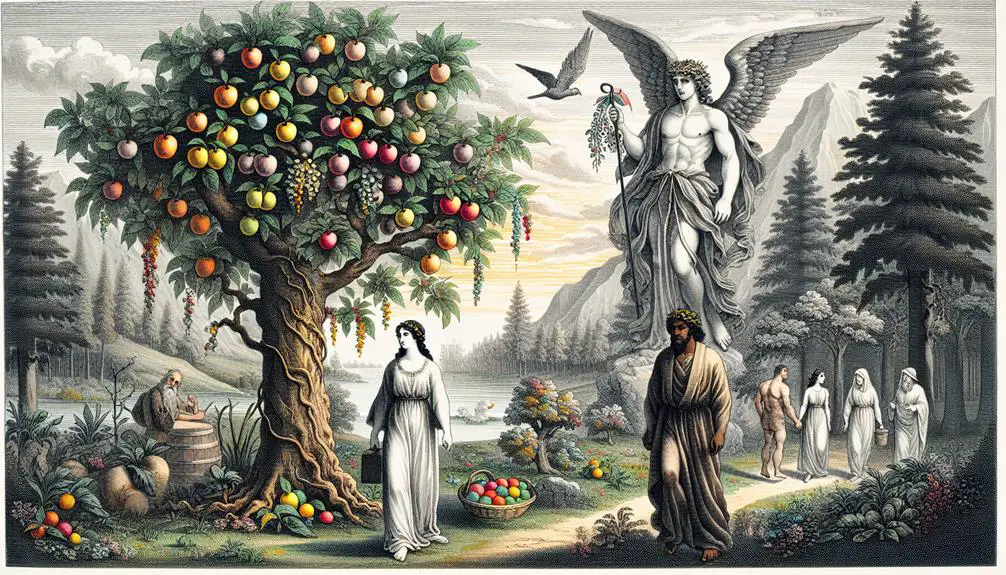
Adam and Eve's expulsion from the Garden of Eden marks a pivotal moment in biblical narratives, illustrating the profound consequences of disobedience and the inception of human exile. This event, deeply embedded in Judeo-Christian teachings, not only introduces the concept of original sin but also sets a precedent for understanding human nature and its inherent flaws.
The Garden temptation, as narrated, is a test of obedience against the allure of forbidden knowledge. You're told of a serpent, the embodiment of temptation, who persuades Eve to eat from the Tree of Knowledge of Good and Evil, contrary to God's explicit command. This act of defiance, followed by Adam's participation, triggers their immediate banishment from Eden, a paradise of innocence and immortality.
Analyzing this narrative, you observe how original sin isn't just about disobedience but also about the loss of direct communion with the divine. The banishment symbolizes a spiritual exile, a severance of the intimate relationship humans once held with their Creator. It's a profound commentary on the human condition, emphasizing the repercussions of actions and the inherent struggle between moral integrity and temptation.
Furthermore, this story lays the foundational ethos for themes of redemption and salvation that permeate biblical texts. It's a stark reminder of the cost of freedom and the complexity of human agency. Through Adam and Eve's story, you're invited to reflect on the nature of temptation, the weight of decisions, and the relentless quest for redemption in the face of perpetual exile.
Jacob's Flight to Haran

Reflecting on the theme of exile in the biblical narrative, Jacob's flight to Haran emerges as another pivotal story that underscores the complexities of familial conflict and divine intervention in human affairs. This episode isn't merely about geographical relocation but embodies a profound journey of personal transformation and divine encounter. At its core, Jacob's departure from Beersheba to Haran is instigated by the need to escape his brother Esau's wrath, a consequence of Jacob's own deceit in securing Isaac's blessing meant for the firstborn.
In Haran, Jacob's experiences are marked by a series of significant encounters and events. Central to this narrative is Laban's deception. Initially, Jacob's arrival in Haran is propelled by a desire for refuge and the intent to find a wife from his mother Rebekah's family. However, Laban, Jacob's uncle, exploits his nephew's labor under the guise of familial hospitality. Jacob agrees to work for Laban for seven years to marry Rachel, whom he loves deeply. Yet, Laban's deception culminates in Jacob unwittingly marrying Leah, Rachel's sister, necessitating another seven years of labor for Rachel. This intricate dynamic of deception and labor underlines a broader theme of exile and return, as Jacob's sojourn in Haran becomes a period of both personal loss and spiritual growth.
The narrative arc of Jacob's flight to Haran, enriched by the elements of Laban's deception and Rachel's love, offers a nuanced exploration of the exile theme. It highlights how exile can serve as a crucible for character development, reshaping identities and destinies through divine guidance and human resilience.
Joseph's Enslavement in Egypt
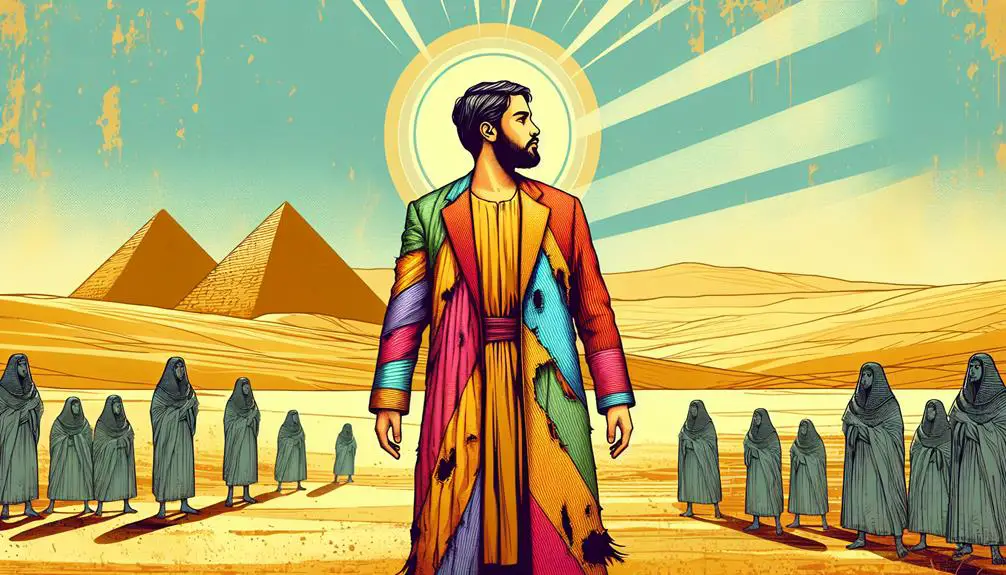
You must consider how Joseph's enslavement in Egypt sets the stage for his unique role in biblical history.
His ability to interpret dreams not only saves Egypt from famine but also propels him to a position of significant influence.
This transition from slave to advisor illustrates the complexities of power dynamics and divine providence within the narrative.
Joseph's Dream Interpretation
Joseph's adept interpretation of dreams marked a pivotal turn in his journey from enslavement to a position of power within the Egyptian hierarchy. His interpretation skills weren't just a mere party trick; they were deeply rooted in understanding dream symbolism and the cultural context of those dreams. This skill set him apart and eventually paved his way through the Egyptian social structure.
Consider the following elements that highlight the sophistication of Joseph's dream interpretation skills:
- Attention to Detail: Joseph meticulously analyzed every element within the dreams, recognizing symbols that others overlooked.
- Cultural Insight: He possessed a profound understanding of Egyptian symbolism, crucial for accurate interpretations.
- Emotional Intelligence: Joseph empathized with the dreamers, allowing him to gauge the emotional undercurrents of their dreams.
- Strategic Communication: He conveyed the interpretations in a manner that was both respectful and persuasive, ensuring his insights were valued and acted upon.
Rise to Egyptian Power
Building on his unique skill in dream interpretation, Joseph's journey took a dramatic turn when he was enslaved and brought to Egypt, marking the beginning of his ascent to a position of significant influence within the Egyptian hierarchy. His ability to interpret Pharaoh's dream accurately, foreseeing seven years of abundance followed by seven years of famine, not only saved Egypt but also demonstrated the complex interactions between divine providence and human agency. This episode underlines the nuanced relationship between the Hebrews and the Hyksos rulers, suggesting a period of mutual benefit and cultural exchange.
Factor |
Impact on Joseph |
Broader Implication |
|---|---|---|
Dream Interpretation |
Ascension to Power |
Influence on Egyptian Policy |
Hyksos Rulers |
Political Leverage |
Hebrew-Egyptian Relations |
Famine Forewarning |
Economic Strategy |
Survival Strategy |
Enslavement |
Rise to Authority |
Socio-Political Mobility |
Divine Providence |
Legitimization |
Interplay of Fate & Free Will |
Moses: Exile in Midian

Upon fleeing Egypt due to fears of retribution for killing an Egyptian, Moses found himself in Midian, marking the commencement of his period of exile. This phase of Moses' life is pivotal, transforming him from a fugitive to a prophetic leader. His time in Midian is characterized by several key events that underscore this transformation:
- Encounter with the Midianite Priest: Moses' exile begins with his integration into the Midianite community, where he marries Zipporah, the daughter of Jethro, a priest of Midian. This alliance is significant, as it anchors Moses in a new social and familial context, laying the groundwork for his future leadership.
- The Burning Bush: Perhaps the most defining moment of Moses' exile is his encounter with God through the burning bush on Mount Horeb. This event marks his divine commission to lead the Israelites out of Egypt, signifying a direct intervention by the divine in his life and setting the stage for the liberation of the Israelites.
- Zipporah's Intervention: Zipporah's crucial act of circumcising their son to avert God's wrath further emphasizes the importance of Moses' family ties in Midian, contributing to his spiritual and leadership development.
- Return to Egypt: Emboldened by his experiences and divine mandate, Moses returns to Egypt, transitioning from exile to deliverer. This shift underscores the transformative power of his exile, from a fugitive to a figure of liberation and faith.
Moses' exile in Midian is thus a critical period of personal growth, spiritual awakening, and preparation for his monumental task of leading the Israelites to freedom.
The Babylonian Captivity
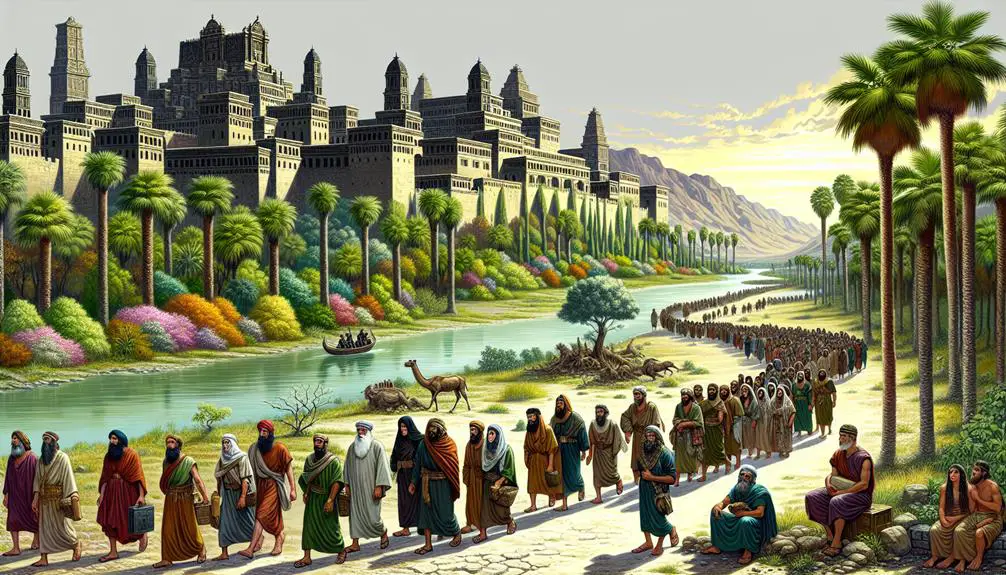
You'll find that the Babylonian Captivity marks a pivotal moment in Jewish history, fundamentally altering the community's religious and cultural identity.
The causes of this captivity stem from political, social, and religious tensions that culminated in the exile of the Judean elite.
Its impact on Judaism can't be overstated, as it led to significant theological developments and the emergence of the synagogue as a central place of worship.
Causes of Captivity
Historically, the Babylonian Captivity, a pivotal event in Jewish history, resulted primarily from the Kingdom of Judah's political rebellions and failure to adhere to covenantal obligations, as interpreted by biblical narratives. This period underscores a complex interplay of factors that led to the exile:
- Political upheaval: Judah's strategic positioning made it a focal point of Assyrian and later Babylonian expansionism, exacerbating internal instability.
- Failure to pay tribute: Repeated failures to pay tributes to Babylon triggered military responses.
- Religious reforms: Efforts to centralize worship in Jerusalem conflicted with prevailing practices, leading to internal discord.
- Alliances with Egypt: Ill-advised political alliances with Egypt antagonized Babylon, precipitating military retaliation.
These dimensions collectively catalyzed the Babylonian Captivity, marking a transformative epoch in Jewish history.
Impact on Judaism
The Babylonian Captivity profoundly reshaped Judaism, catalyzing significant religious, social, and cultural transformations within the exiled community. This period marked a pivotal shift, fostering Diaspora reflections that deeply influenced the collective Jewish identity.
You observe a remarkable display of cultural resilience as Judaism adapted to the challenges of displacement. The community's ability to maintain, reinterpret, and even expand their traditions in the face of adversity is a testament to their enduring spirit. This resilience facilitated the preservation and evolution of Jewish thought, practices, and communal life, ensuring Judaism's continuity far beyond its geographic origins.
Through the crucible of captivity, you see the emergence of a more cohesive and adaptable faith, laying the groundwork for future Jewish diaspora communities worldwide.
Daniel in the Lion's Den
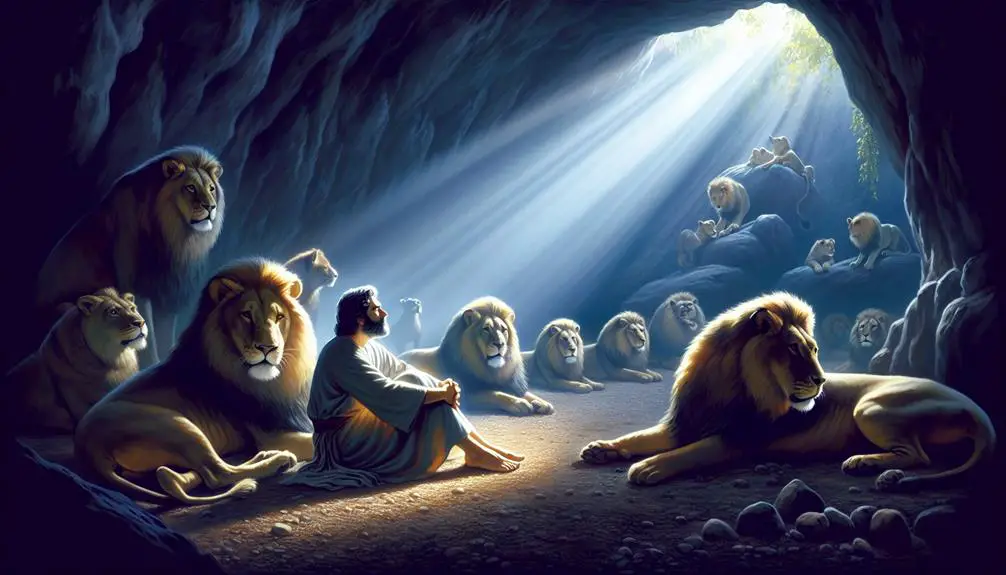
Examining the biblical tale of 'Daniel in the Lion's Den,' we uncover a profound narrative of faith, politics, and divine intervention that resonates deeply within the context of exile literature. This story, set against the backdrop of Daniel's unwavering trust in God amidst dire circumstances, serves as a pivotal examination of faith's test and the symbolism of lions.
The narrative unfolds within a complex framework of loyalty, envy, and divine protection, highlighting several critical aspects:
- Lions' Symbolism: Traditionally, lions represent power, dominance, and royal authority. In this context, they symbolize the seemingly insurmountable challenges and adversaries Daniel faces due to his faith. Yet, their eventual harmlessness underscores the transformative power of divine intervention.
- Faith's Test: Daniel's ordeal in the lions' den epitomizes the ultimate test of faith. His calmness and unwavering belief in God's protection, even when faced with death, offer a profound lesson on the strength and resilience of faith under persecution.
- Political Intrigue: The story is deeply embedded in the politics of the Babylonian court. Daniel's rise to prominence incites jealousy among other officials, leading to a scheme designed to exploit his religious devotion as a means to his downfall. This political maneuvering adds a layer of complexity to the narrative, revealing the interplay between personal integrity and political survival.
- Divine Intervention: The miraculous saving of Daniel from the lions' jaws serves as a testament to God's power and a vindication of Daniel's faith. This divine intervention not only reinforces the theme of God's omnipotence but also illustrates the protection afforded to those who remain faithful amidst adversity.
In essence, Daniel's experience in the lions' den encapsulates a timeless narrative of faith's triumph over adversity, divine providence, and the enduring struggle between righteousness and corruption.
Esther's Exile in Persia

Within the rich tapestry of biblical narratives, Esther's exile in Persia emerges as a compelling study of identity, power, and divine orchestration in the face of existential threat. You'll find that her story, set against the backdrop of Persian politics, provides a unique lens through which to examine the complexities of life in exile. Esther, an orphaned Jewish girl, becomes queen of Persia, yet her identity and her people's fate hang in a precarious balance due to the machinations within the Persian court.
Esther's narrative intricately intertwines with the political strategies and social hierarchies of her time. You see, her ascension to queen isn't just a personal triumph but a pivotal moment in the survival of the Jewish people in diaspora. Her courage to reveal her Jewish identity to King Ahasuerus, risking her position and life, underlines the tension between assimilation and maintaining one's cultural and religious identity in exile.
Moreover, the story of Esther is foundational to the origins of the Festival of Purim, celebrated to commemorate the deliverance of the Jewish people from genocide. This festival's origins, deeply rooted in Esther's experiences, highlight the interplay between Persian politics and the maintenance of Jewish identity and traditions in exile. It serves as a reminder of resilience, the power of strategic intervention, and the significance of remembering and celebrating deliverance and survival against the odds.
Thus, Esther's exile in Persia isn't merely a tale of individual bravery; it's a nuanced exploration of survival strategies, identity negotiation, and the complexities of living under foreign rule, all woven into the fabric of Persian politics and the origins of a significant Jewish festival.
Jesus: The Wilderness Temptation

After a forty-day fast in the wilderness, Jesus faced a series of temptations from the devil, presenting a profound moment of spiritual testing and resilience. This desert solitude wasn't merely a physical challenge; it was a crucible for temptation endurance, illuminating the depth of Jesus' commitment to His divine mission. The narrative showcases a multifaceted confrontation, rich in symbolism and instructive for understanding the dynamics of spiritual fortitude in the face of temptation.
The temptations, as recorded, unfold in a sequence that tests Jesus on various levels:
- The Temptation of Provision: The devil challenges Jesus to turn stones into bread, exploiting human vulnerability—hunger. This temptation probes the trust in divine providence versus succumbing to immediate physical needs.
- The Temptation of Power: Jesus is shown all the kingdoms of the world and offered dominion over them. This tests the allure of worldly power against the kingdom of God's principles of servitude and humility.
- The Temptation of Presumption: The devil dares Jesus to throw Himself from the temple's pinnacle, promising angelic intervention. This temptation scrutinizes the misuse of divine promises for personal validation or testing God's faithfulness.
- The Temptation of Worship: The ultimate proposition is the devil's demand for worship in exchange for worldly glory. This examines the fundamental allegiance of the human heart—whether to worship the creator or the creation.
Through these confrontations, Jesus' responses demonstrate not only the temptation endurance but also a profound reliance on scriptural truth as the basis for overcoming. The desert solitude, thus, becomes a testament to the power of spiritual integrity over physical and psychological allurements.
Frequently Asked Questions
How Did the Concept of Exile in the Bible Influence the Development of Jewish Identity and Theological Thought?
You're diving into how the upheaval shaped Jewish identity and theology. It wasn't just about losing a homeland; it was a catalyst for profound reflection and transformation.
The concepts of Covenant Renewal and Prophetic Visions became essential. Through these, you see a community redefining its relationship with the divine, emphasizing faithfulness amidst adversity.
This period wasn't just a historical footnote; it was instrumental in evolving Jewish theological thought and identity.
Are There Any Patterns or Common Themes in the Reasons Why Individuals or Groups Are Exiled in the Biblical Narratives?
In exploring the reasons behind exiles, you'll notice a tapestry of motivations, woven with threads of punishment paradigms. These narratives often highlight disobedience, betrayal, or moral failures as common catalysts.
Through an analytical lens, you'll see that these motivations aren't just punitive; they're didactic, teaching lessons on faith, loyalty, and divine justice. Each story, rich in detail, underscores a pattern where exile serves as a consequence and a catalyst for transformation.
How Did the Various Exiles Impact the Religious Practices and Beliefs of the Israelites, Particularly in Terms of Their Relationship With God?
When you explore the impact of various exiles, you'll find they significantly transformed the Israelites' religious practices and beliefs. Without access to the Temple, they had to adapt. This led to major changes in Temple rituals and sacrificial practices.
You'll notice a shift towards more personal and communal forms of worship. This evolution in practice underscored a deeper, more introspective relationship with God, reflecting a broadening understanding of worship beyond physical locations.
In What Ways Have Modern Scholars Interpreted the Symbolic Meanings of Exile in the Bible, and How Do These Interpretations Vary Across Different Cultures and Religious Traditions?
You're diving into how modern scholars delve into the symbolic meanings of exile, igniting cultural reinterpretations and scholarly debates.
These experts dissect its layered significance across varying cultures and religious traditions, showcasing a tapestry of perspectives.
They argue over its metaphorical versus literal interpretations, exploring how these narratives shape identity, faith, and community resilience.
Each culture adds its unique spin, enriching the understanding of exile's profound impact on human experience.
Can Parallels Be Drawn Between the Biblical Exiles and Contemporary Examples of Displacement or Diaspora, and What Lessons Might These Stories Offer to Modern Societies Dealing With Issues of Migration and Identity?
You can indeed draw parallels between contemporary displacement or diaspora and historical narratives. These stories shed light on how societies grapple with migration and identity issues, emphasizing the effects of globalization and highlighting cultural resilience.
Conclusion
In your journey through biblical narratives, you've walked alongside figures thrust into exile, each story a thread in the tapestry of redemption and resilience. Like Dante navigating the inferno or Odysseus's odyssey home, these exiles embody the universal quest for belonging and identity amidst trials.
Their stories, more than ancient history, are mirrors reflecting our own exile experiences in life's metaphorical wilderness, urging us to find our path back, not just to a place, but to a sense of purpose.

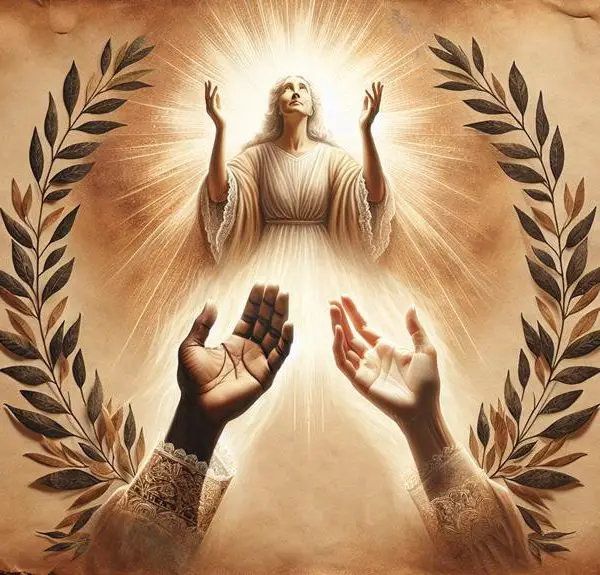

Sign up